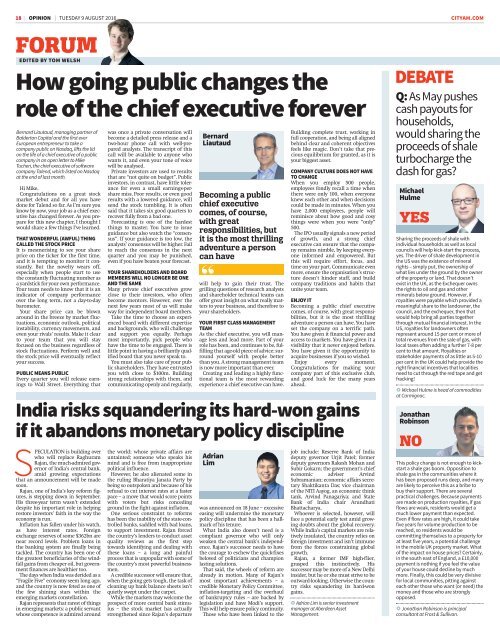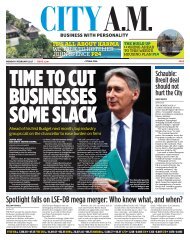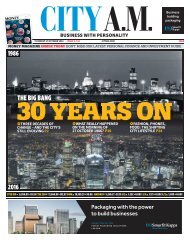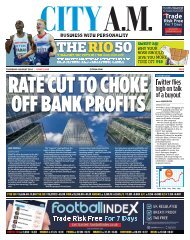You also want an ePaper? Increase the reach of your titles
YUMPU automatically turns print PDFs into web optimized ePapers that Google loves.
18 OPINION TUESDAY 9 AUGUST 2016<br />
CITYAM.COM<br />
FORUM<br />
EDITED BY TOM WELSH<br />
How going public changes the<br />
role of the chief executive forever<br />
Bernard Liautaud, managing partner of<br />
Balderton Capital and the first ever<br />
European entrepreneur to take a<br />
company public on Nasdaq, lifts the lid<br />
on the life of a chief executive of a public<br />
company in an open letter to Mike<br />
Tuchen, the chief executive of software<br />
company Talend, which listed on Nasdaq<br />
at the end of last month.<br />
Hi Mike,<br />
Congratulations on a great stock<br />
market debut and for all you have<br />
done for Talend so far. As I’m sure you<br />
know by now, your job as a chief executive<br />
has changed forever. As you prepare<br />
for this new chapter, I thought I<br />
would share a few things I’ve learned.<br />
THAT WONDERFUL (AWFUL) THING<br />
CALLED THE STOCK PRICE<br />
It is mesmerising to see your share<br />
price on the ticker for the first time,<br />
and it is tempting to monitor it constantly.<br />
But the novelty wears off,<br />
especially when people start to use<br />
the constantly fluctuating number as<br />
a yardstick for your own performance.<br />
Your team needs to know that it is an<br />
indicator of company performance<br />
over the long term, not a day-to-day<br />
barometer.<br />
Your share price can be blown<br />
around in the breeze by market fluctuations,<br />
economic outlook, political<br />
instability, currency movements, and<br />
even your rivals’ results. Make it clear<br />
to your team that you will stay<br />
focused on the business regardless of<br />
stock fluctuations. Perform well and<br />
the stock price will eventually reflect<br />
your success.<br />
PUBLIC MEANS PUBLIC<br />
Every quarter you will release earnings<br />
to Wall Street. Everything that<br />
SPECULATION is building over<br />
who will replace Raghuram<br />
Rajan, the much-admired governor<br />
of India’s central bank,<br />
amid growing expectations<br />
that an announcement will be made<br />
soon.<br />
Rajan, one of India’s key reform figures,<br />
is stepping down in September.<br />
His three-year term wasn’t extended<br />
despite his important role in helping<br />
restore investors’ faith in the way the<br />
economy is run.<br />
Inflation has fallen under his watch,<br />
as have interest rates. Foreign<br />
exchange reserves of some $362bn are<br />
near record levels. Problem loans in<br />
the banking system are finally being<br />
tackled. The country has been one of<br />
the greatest beneficiaries of the windfall<br />
gains from cheaper oil, but government<br />
finances are healthier too.<br />
The days when India was derided as a<br />
“Fragile Five” economy seem long ago,<br />
and the country is now feted as one of<br />
the few shining stars within the<br />
emerging markets constellation.<br />
Rajan represents that rarest of things<br />
in emerging markets: a public servant<br />
whose competence is admired around<br />
was once a private conversation will<br />
become a detailed press release and a<br />
two-hour phone call with well-prepared<br />
analysts. The transcript of this<br />
call will be available to anyone who<br />
wants it, and even your tone of voice<br />
will be analysed.<br />
Private investors are used to results<br />
that are “not quite on budget”. Public<br />
investors, in contrast, have little tolerance<br />
for even a small earnings-pershare<br />
miss. Poor results, or even good<br />
results with a lowered guidance, will<br />
send the stock tumbling. It is often<br />
said that it takes six good quarters to<br />
recover fully from a bad one.<br />
Forecasting is one of the hardest<br />
things to master. You have to issue<br />
guidance but also watch the “consensus”.<br />
If your guidance is too low, the<br />
analysts’ consensus will be higher. Fail<br />
to reach the consensus in the next<br />
quarter and you may be punished,<br />
even if you have beaten your forecast.<br />
YOUR SHAREHOLDERS AND BOARD<br />
MEMBERS WILL NO LONGER BE ONE<br />
AND THE SAME<br />
Many private chief executives grow<br />
close to their investors, who often<br />
become mentors. However, over the<br />
next few years most of us will make<br />
way for independent board members.<br />
Take the time to choose an experienced<br />
board with different expertise<br />
and backgrounds, who will challenge<br />
and support you equally. Perhaps<br />
most importantly, pick people who<br />
have the time to be engaged. There is<br />
little point in having a brilliantly qualified<br />
board that you never speak to.<br />
You must also take care of your public<br />
shareholders. They have entrusted<br />
you with close to $100m. Building<br />
strong relationships with them, and<br />
communicating openly and regularly,<br />
the world; whose private affairs are<br />
untainted; someone who speaks his<br />
mind and is free from inappropriate<br />
political influence.<br />
However, he also alienated some in<br />
the ruling Bharatiya Janata Party by<br />
being so outspoken and because of his<br />
refusal to cut interest rates at a faster<br />
pace – a move that would score points<br />
with voters but risks conceding<br />
ground in the fight against inflation.<br />
One serious constraint to reforms<br />
has been the inability of the state-controlled<br />
banks, saddled with bad loans,<br />
to support investment. Rajan forced<br />
the country’s lenders to conduct asset<br />
quality reviews as the first step<br />
towards identifying and dealing with<br />
these loans – a long and painful<br />
process that is unpopular with some of<br />
the country’s most powerful businessmen.<br />
A credible successor will ensure that,<br />
when the going gets tough, the task of<br />
cleaning up bank balance sheets isn’t<br />
quietly swept under the carpet.<br />
While the markets may welcome the<br />
prospect of more central bank stimulus<br />
– the stock market has actually<br />
strengthened since Rajan’s departure<br />
Bernard<br />
Liautaud<br />
Becoming a public<br />
chief executive<br />
comes, of course,<br />
with great<br />
responsibilities, but<br />
it is the most thrilling<br />
adventure a person<br />
can have<br />
will help to gain their trust. The<br />
grilling questions of research analysts<br />
and shareholder technical teams can<br />
offer great insight on what really matters<br />
to your business, and therefore to<br />
your shareholders.<br />
YOUR FIRST CLASS MANAGEMENT<br />
TEAM<br />
As the chief executive, you will manage<br />
less and lead more. Part of your<br />
role has been, and continues to be, fulfilling<br />
that age-old piece of advice: surround<br />
yourself with people better<br />
than you. A strong management team<br />
is now more important than ever.<br />
Creating and leading a highly functional<br />
team is the most rewarding<br />
experience a chief executive can have.<br />
was announced on 18 June – excessive<br />
easing will undermine the monetary<br />
policy discipline that has been a hallmark<br />
of his tenure.<br />
What India also doesn’t need is a<br />
compliant governor who will only<br />
weaken the central bank’s independence.<br />
Rajan’s successor needs to have<br />
the courage to eschew the quick-fixes<br />
beloved of politicians and champion<br />
lasting solutions.<br />
That said, the wheels of reform are<br />
already in motion. Many of Rajan’s<br />
most important achievements – a<br />
credible Monetary Policy Committee,<br />
inflation-targeting and the overhaul<br />
of bankruptcy rules – are backed by<br />
legislation and have Modi’s support.<br />
This will help ensure policy continuity.<br />
Those who have been linked to the<br />
Building complete trust, working in<br />
full cooperation, and being all aligned<br />
behind clear and coherent objectives<br />
feels like magic. Don’t take that precious<br />
equilibrium for granted, as it is<br />
your biggest asset.<br />
COMPANY CULTURE DOES NOT HAVE<br />
TO CHANGE<br />
When you employ 500 people,<br />
employees fondly recall a time when<br />
there were only 100, when everyone<br />
knew each other and when decisions<br />
could be made in minutes. When you<br />
have 2,000 employees, people will<br />
reminisce about how good and cosy<br />
things were when you were “only”<br />
500.<br />
The IPO usually signals a new period<br />
of growth, and a strong chief<br />
executive can ensure that the company<br />
remains nimble, by keeping everyone<br />
informed and empowered. But<br />
this will require effort, focus, and<br />
time on your part. Communicate even<br />
more, ensure the organisation’s structure<br />
doesn’t hinder staff, and build<br />
company traditions and habits that<br />
unite your team.<br />
ENJOY IT<br />
Becoming a public chief executive<br />
comes, of course, with great responsibilities,<br />
but it is the most thrilling<br />
adventure a person can have. You have<br />
set the company on a terrific path.<br />
You have given it financial power and<br />
access to markets. You have given it a<br />
visibility that it never enjoyed before.<br />
You have given it the opportunity to<br />
acquire businesses if you so wished.<br />
Enjoy every moment.<br />
Congratulations for making your<br />
company part of this exclusive club,<br />
and good luck for the many years<br />
ahead.<br />
India risks squandering its hard-won gains<br />
if it abandons monetary policy discipline<br />
Adrian<br />
Lim<br />
job include: Reserve Bank of India<br />
deputy governor Urjit Patel; former<br />
deputy governors Rakesh Mohan and<br />
Subir Gokarn; the government’s chief<br />
economic adviser Arvind<br />
Subramanian; economic affairs secretary<br />
Shaktikanta Das; vice chairman<br />
of the NITI Aayog, an economic think<br />
tank, Arvind Panagariya; and State<br />
Bank of India chair Arundhati<br />
Bhattacharya.<br />
Whoever is selected, however, will<br />
face a potential early test amid growing<br />
doubts about the global recovery.<br />
While India’s capital markets are relatively<br />
insulated, the country relies on<br />
foreign investment and isn’t immune<br />
from the forces constraining global<br />
growth.<br />
Rajan, a former IMF high-flier,<br />
grasped this instinctively. His<br />
successor may be more of a New Delhi<br />
insider, but he or she must strive to be<br />
outward-looking. Otherwise the country<br />
risks squandering its hard-won<br />
gains.<br />
£ Adrian Lim is senior investment<br />
manager at Aberdeen Asset<br />
Management.<br />
DEBATE<br />
Q: As May pushes<br />
cash payouts for<br />
households,<br />
would sharing the<br />
proceeds of shale<br />
turbocharge the<br />
dash for gas?<br />
Michael<br />
Hulme<br />
YES<br />
Sharing the proceeds of shale with<br />
individual households as well as local<br />
councils will help kick-start the process,<br />
yes. The driver of shale development in<br />
the US was the existence of mineral<br />
rights – simply put, the ownership of<br />
what lies under the ground by the owner<br />
of the property or land. That doesn’t<br />
exist in the UK, as the Exchequer owns<br />
the rights to oil and gas and other<br />
minerals below ground. However, if<br />
royalties were payable which provided a<br />
meaningful share to the landowner, the<br />
council, and the exchequer, then that<br />
would help bring all parties together<br />
through mutual financial interest. In the<br />
US, royalties for landowners often<br />
represent around 15 per cent or more of<br />
total revenues from the sale of gas, with<br />
local taxes often adding a further 7-8 per<br />
cent to that amount. Royalties or<br />
stakeholder payments of as little as 5-10<br />
per cent in the UK could help provide the<br />
right financial incentives that localities<br />
need to cut through the red tape and get<br />
fracking!<br />
£ Michael Hulme is head of commodities<br />
at Carmignac.<br />
Jonathan<br />
Robinson<br />
NO<br />
This policy change is not enough to kickstart<br />
a shale gas boom. Opposition to<br />
shale gas in the communities where it<br />
has been proposed runs deep, and many<br />
are likely to perceive this as a bribe to<br />
buy their support. There are several<br />
practical challenges. Because payments<br />
are made on production royalties, if gas<br />
flows are weak, residents would get a<br />
much lower payment than expected.<br />
Even if flow rates are high, it could take<br />
five years for volume production to be<br />
reached, so residents would be<br />
committing themselves to a property for<br />
at least five years, a potential challenge<br />
in the mobile UK property market. What<br />
of the impact on house prices? Certainly,<br />
in the south east of England, a £10,000<br />
payment is nothing if you feel the value<br />
of your house could decline by much<br />
more. Finally, this could be very divisive<br />
for local communities, pitting against<br />
each other those who want (or need) the<br />
money and those who are strongly<br />
opposed.<br />
£ Jonathan Robinson is principal<br />
consultant at Frost & Sullivan.
















